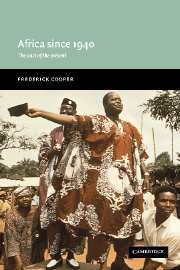Book contents
- Frontmatter
- Contents
- List of plates
- List of figures
- List of maps
- List of tables
- Preface
- Map 1 Africa: countries and cities, c. 2000
- 1 Introduction: from colonies to Third World
- 2 Workers, peasants, and the crisis of colonialism
- 3 Citizenship, self-government, and development: the possibilities of the post-war moment
- 4 Ending empire and imagining the future
- Interlude: rhythms of change in the post-war world
- 5 Development and disappointment: social and economic change in an unequal world, 1945–2000
- 6 The late decolonizations: southern Africa 1975, 1979, 1994
- 7 The recurrent crises of the gatekeeper state
- 8 Africa at the century's turn: South Africa, Rwanda, and beyond
- Index
- References
4 - Ending empire and imagining the future
- Frontmatter
- Contents
- List of plates
- List of figures
- List of maps
- List of tables
- Preface
- Map 1 Africa: countries and cities, c. 2000
- 1 Introduction: from colonies to Third World
- 2 Workers, peasants, and the crisis of colonialism
- 3 Citizenship, self-government, and development: the possibilities of the post-war moment
- 4 Ending empire and imagining the future
- Interlude: rhythms of change in the post-war world
- 5 Development and disappointment: social and economic change in an unequal world, 1945–2000
- 6 The late decolonizations: southern Africa 1975, 1979, 1994
- 7 The recurrent crises of the gatekeeper state
- 8 Africa at the century's turn: South Africa, Rwanda, and beyond
- Index
- References
Summary
French and British rule in Africa collapsed not because of an all-out assault from a clearly defined colonized people, but because the imperial system broke apart at its internal cracks, as Africans selectively incorporated into political structures based on citizenship or self-determination seized the initiative and escalated their demands for power. Meanwhile, in the mid-1950s Portuguese and Belgian rulers, and the whites who dominated South Africa, were vigorously holding on to political power and appropriating economic gains for a tiny fraction of the population. However, they were slowly moving from being ordinary members of an international club where colonialism was the norm to being outliers in a new world where legitimacy was measured in terms of progress toward self-government and economic development (chapter 6). In the long run, neither Portugal, Belgium, nor South Africa could contain the pressures coming from neighboring territories or from the transformation of international norms, but it was the colonialism that identified itself with political reform and economic development that first proved unsustainable.
By 1956 or 1958 French and British governments knew that the colonial endgame had begun. But where could colonial governments set the limits on the kinds of politics allowed in the ambiguous space between colonial domination and territorial autonomy? What could the first generation of African political leaders allowed a measure of power do with their opportunities?
- Type
- Chapter
- Information
- Africa since 1940The Past of the Present, pp. 66 - 84Publisher: Cambridge University PressPrint publication year: 2002



